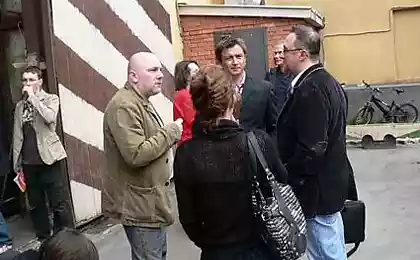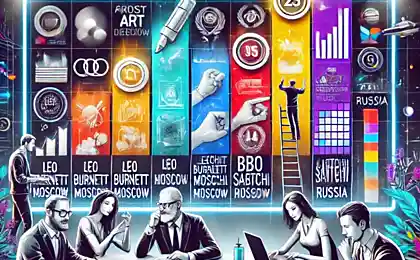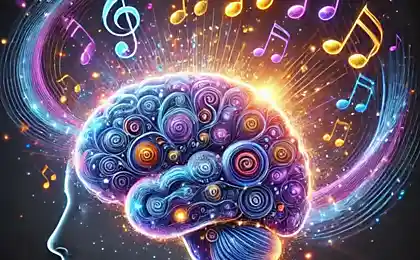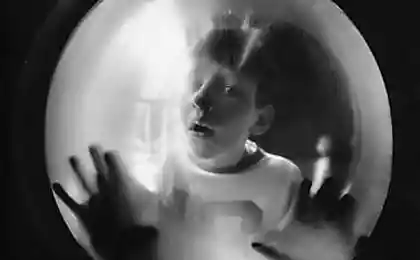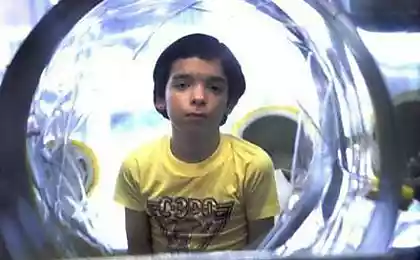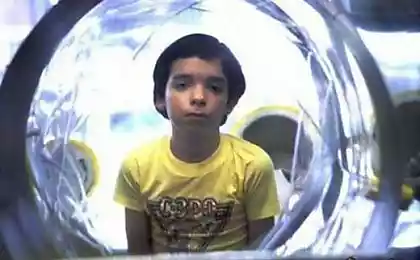585
"Easy silence and listening can change your life": an interview with David toop
David Blunt is a musician, improviser, working with John Zorn and Evan Parker, sound artist, author of the first serious study of hip-hop "Rap attack" and one of the most influential music critics, which became a kind of cult of the Wire magazine. His books are Stupid builds like personal diaries, tracing the history of musical styles and describing all the possible ways of existence of the sound. We talked with the musician on the eve of his lectures in the program Selector PRO organized by British Council together with the Strelka Institute.

— I would like to start a conversation with the term "distant music", which you borrowed from James Joyce and which apply to completely different music, from Gregorian chant to Panda Bear. Would it be correct to understand your concept in the sense that it abstract, subtle sound best expresses the mysterious nature of man?
I think it has to do with the idea of "elusive phantom of life" (quote from the novel "Moby dick." — Approx. ed.). It refers to one of the main problems — the problem of consciousness, which we do not fully understand. Which in turn means that we do not fully understand who we are in relation to the reality that surrounds us. It seems to me that this kind of remote, barely perceivable music represents a symbol. Even music, with its intangibility, invisibility and seeming formlessness is itself a good metaphor to Express a lack of understanding of who we are.
— In your recent book Sinister Resonance you write about the history of hearing about how before the invention of the mechanical recordings of sound to represent in silent arts, particularly in painting. This is due to the work of our imagination, or the influence of different types of sensory perception?
For me it is important that the communication between the senses. We do not perceive a world of separate portions of information. At some point I changed my view on art, started looking at it in the whole totality of sense-perception — as, for example, we perceive for the first time, any person noticing a lot of different things at the same time. So I started to think inside of pictures and "listen" to them. It is familiar to us in literature, which in this sense is more clear — it describes many different feelings and thoughts. However, no art historian had serious attitude towards my concept. A few of them will perceive the picture as a sound representation. Besides, I can't accurately prove that it exists.
On the other hand, we're allowed to look at the painting narratives, why then not look for sounds?
Exactly. Generally in recent years with the growth of the popular arts, the idea of narrative has become widespread because it is easy to understand. They like the idea that everything is a story. But if it can be done, why not say that the feeling of silence in the film was deliberately introduced by the artist? I think I can come up with such theories, because I'm not an art historian, my job does not depend on to come up with any consistent theory.
— You wrote a lot about how each particular sound man fixed certain associations that allow the sounds to directly affect our emotions: fear, caused by some signal sounds, or the feeling of loneliness and anxiety associated with silence. Why, in your opinion, melody, harmony and rhythm are in General such a strong emotional impact on people? If it's in deep memory and associations, then some less conventional forms, e.g. field recordings, could be more effective in this sense.
Your question consists of several parts. I think you are right that field recordings can potentially serve as a powerful tool for influencing the deep memory that is associated with our emotional experiences. However, most do not know about how such use of field recordings. I will give a small example. A couple of weeks ago I was walking with his students along the Thames. Our mini-course dedicated to the topic of the relation between the sound of water. We just walked in silence and listened. At the end of day one of the students said it was one of the most incredible things that happened to him in life. And we weren't doing anything, just walking for fifteen minutes! Simple silence and listening can change your life. Same with field recordings. You can play the recording to anyone (I don't like the concept of "ordinary people", but you know what I mean — someone far from these things), and this entry will have a profound effect, because there will be a new experience.
The theme of conventionality in music has always been one of the most important to me. We grow up in certain cultural environment, which accompanies us from birth and possibly before birth. Certain pitch relationships, rhythmic structure gives us a feeling of comfort. I pretty early realized that the cultural frame makes me a person I don't want to be. When I started to discover music of other cultures and bioacoustics — the sounds of birds, mammals, insects, fish, — I'm so deeply immersed in these sounds that almost ceased to distinguish the tempered tuning, consonance and regular rhythms. For nearly half a century, this hearing, I think, changed my way of hearing. However, I like to listen to a pleasant sequence of chords or play it as a guitarist. In it, I notice our commitment to resolve, which arose in the result of rational formalization of many centuries ago.
One of the things I observed throughout life, is the gradual disappearance of alternative musical approaches to the music. They die just as animals disappear. It is important to record — literally — of these forms, because they show other ways of human existence.
In the book "Ocean of sound" you describe a particular paradigm of European music which began with Debussy when he first heard Javanese gamelan. This paradigm you characterize the fundamental openness of the form. Do you think that this openness could be achieved only by non-Western musical practices?
— I chose Debussy as a starting point, because it was important the beginning of formal openness, but also the moment of recognition that the Europeans are not the most advanced creatures in the world. Debussy acknowledged that some aspects of Javanese music superior to European models. It was almost inexcusable position for a European at the time. But if you listen to these old Javanese gamelan, you will notice how they are unusual from the point of view of synchronicity — people more or less play each at their own pace. We also think that everything should be closed, and that explains the nature of social relations in which we live: if you're struggling, I immediately become an outcast. But is that the open form is characteristic only of non-Western music? I'm not sure what constitutes the West. Not necessary to go far to find something completely different and excellent.
The interest of Europeans to the East in the nineteenth century, as we know, was an important component of colonialism. The current interest in exotic music is largely due to the global tourist market. Do you think that a radical change of experimental music to the East in the mid-twentieth century, in particular, John cage, had nothing to do with the colonialism?
I think he certainly had the attitude to colonialism. The effects of colonialism will be srivathsa more than a century, so it's poisoned legacy. Just as slavery is still a pressing issue in the US and the UK. We are surrounded by the consequences of the colonial policy of the nineteenth century, as the new colonialism, which serve corporations like Apple. I think it's a very difficult problem. I wrote the book "Exotic," which tried to describe this problem. In a sense it was self-exploration, trying to understand how I'm involved. I am inclined to think that it is still important to understand other cultural forms than to try to escape from them. In the 1970s it was the subject of fierce political battles, but then Cornelius Cardew wrote "Stockhausen serves imperialism". At that time it seemed that to do something truly local. Today we live in a global world, we are simultaneously talking on Skype, while I am in London, and you...
— In Moscow.
— You in Moscow. So this idea makes no sense. Ultimately, the most important thing is power relations. If you borrow elements of music from the pygmies of the Congo just for exotics, not interested in how this music is made and what is its value, then it refers to the fact that we are discussing. Cage said a lot of strange things, many of which were in this exotic way, but he was a man of his time. One of the most amazing facts about Cage is that he hated jazz. He lived in Manhattan, surrounded by great jazz and Latin music scenes. He criticized the jazz in a regular rhythm, although the cage many of the works have a regular rhythm. Apparently, it went beyond what he wanted to be. He was more interested in Chinese bronze than Charlie Parker and Tito Puente, and this is very strange.
As if he tried to dissociate himself from what surrounded him.
— Yes, and almost all of his essays saying: accept what surrounds you. Going back to your question, this is a complex problem with which I face life. My first book was dedicated to hip-hop. Now she has already received some recognition, but in the beginning I was attacked by critics from all sides: why the white Englishman writes about hip-hop? I think the fact that people want to know exactly what you don't use something just for the sake of his career. Recently there was a discussion on the thirtieth anniversary of the publication of the book. I was afraid of meeting the same criticism. But the audience was pleasant, there was a lot of black people, middle-aged, who were holding the copies of 1984 and were saying how it was an important book, because it put the music in context. And at that time told me: "Why write a book about hip-hop? This is an empty phenomenon that will not last long". I answered that I do not consider it empty phenomenon, but on the contrary, I think serious music with deep roots. But even then I couldn't be sure that this music will not disappear in a year. And I could not have foreseen that she will grow.
— Returning to the subject of open form in Western music of the twentieth century. In the same "Ocean sound" you bring the conversation with Brian Eno and the words that he focused on hearing, not making music, when brought to light the ambient. How, in your opinion, is it possible that this open form became widespread in popular music, which always performs a specific market function?
— That's a good question. First, I don't think it can be light popular music only to its market functions. Thought Adorno: it is only a manipulation for making money. But as we see, popular music does not disappear with time, popular songs of the fifties and sixties continue to love, because this music has a deep emotional component. Secondly, it also reflects the different sides of society. The most obvious example is the rock-n-roll of the 1950s and how he helped to change our thinking in the area of race relations. Popular music is really well suited for the world of Commerce, but the same can be said about almost any music. I've recently finished work on a book about free improvisation. But free improvisation is perhaps the only music you can't use in advertising. Any other music — ambient, techno, rock can be used for perfume or cars.
With regard to the emergence of experimental electronic directions this have to do with a few things. In the late eighties in the music of America and the UK was a sharp turn to commercialization. This was followed by a reaction in most popular music. The nineties was also an interesting time from the point of view of the avant-garde of popular music with acid house and other things. People thought that they move in the direction of a fundamentally different life that was largely drug induced. We know that such things are temporary: people take drugs, behave unusually, but eventually turn out to be conformists with very mediocre work. This is one of the reasons I never really was addicted to drugs, we must continue to deepen, without stopping.
— You mentioned working on a book about free improvisation. The concept of "free" usually put a lot of different meanings. As you understand it in the context of improvised music?
— The subtitle of my book — "Musical improvisation and the dream of freedom". So the problem of freedom is actually a substantial place. When free improvisation began to spread in the mid-sixties, then everyone was talking about freedom. Today, the term "freedom" has become almost the right word: you do what you want without any liability. Meanwhile, free improvisation was the music with a sense of responsibility because people wanted to create a music group, so that no one predetermined result, be it a composer or a conductor.
— Adorno spoke of the conductor as more or less authoritarian figure, given how much power it has with inadequate her contribution to the musical process.
Today it's a pretty obvious idea. The power relations expressed in different musical forms, is obvious. We come to a classical music concert with all its absurd — last comes the conductor, he gets loud applause, he brings flowers — and understand that this is an expression of a certain idea what should be the structure of society. In free improvisation was originally setting: how can we create a music group without any instructions? There is another important feature of free improvisation, shared her hip-hop — she lived longer than anyone could have imagined. People thought that she would disappear somewhere in the seventies, along with the ideas that inspired her. And today we have a electro-acoustic improvisation and many other forms.
I think today we are in deep crisis, politically and economically. In some strange way, these minor classes, which always irritated, become very important. Because they tell us, can be organized differently. Maybe it doesn't work on a global scale, but works great on small communities. And wherever I go worldwide I see people involved in free improvisation in its own way. It may have something to teach.published
P. S. And remember, just changing your mind — together we change the world! ©
Source: theoryandpractice.ru

— I would like to start a conversation with the term "distant music", which you borrowed from James Joyce and which apply to completely different music, from Gregorian chant to Panda Bear. Would it be correct to understand your concept in the sense that it abstract, subtle sound best expresses the mysterious nature of man?
I think it has to do with the idea of "elusive phantom of life" (quote from the novel "Moby dick." — Approx. ed.). It refers to one of the main problems — the problem of consciousness, which we do not fully understand. Which in turn means that we do not fully understand who we are in relation to the reality that surrounds us. It seems to me that this kind of remote, barely perceivable music represents a symbol. Even music, with its intangibility, invisibility and seeming formlessness is itself a good metaphor to Express a lack of understanding of who we are.
— In your recent book Sinister Resonance you write about the history of hearing about how before the invention of the mechanical recordings of sound to represent in silent arts, particularly in painting. This is due to the work of our imagination, or the influence of different types of sensory perception?
For me it is important that the communication between the senses. We do not perceive a world of separate portions of information. At some point I changed my view on art, started looking at it in the whole totality of sense-perception — as, for example, we perceive for the first time, any person noticing a lot of different things at the same time. So I started to think inside of pictures and "listen" to them. It is familiar to us in literature, which in this sense is more clear — it describes many different feelings and thoughts. However, no art historian had serious attitude towards my concept. A few of them will perceive the picture as a sound representation. Besides, I can't accurately prove that it exists.
On the other hand, we're allowed to look at the painting narratives, why then not look for sounds?
Exactly. Generally in recent years with the growth of the popular arts, the idea of narrative has become widespread because it is easy to understand. They like the idea that everything is a story. But if it can be done, why not say that the feeling of silence in the film was deliberately introduced by the artist? I think I can come up with such theories, because I'm not an art historian, my job does not depend on to come up with any consistent theory.
— You wrote a lot about how each particular sound man fixed certain associations that allow the sounds to directly affect our emotions: fear, caused by some signal sounds, or the feeling of loneliness and anxiety associated with silence. Why, in your opinion, melody, harmony and rhythm are in General such a strong emotional impact on people? If it's in deep memory and associations, then some less conventional forms, e.g. field recordings, could be more effective in this sense.
Your question consists of several parts. I think you are right that field recordings can potentially serve as a powerful tool for influencing the deep memory that is associated with our emotional experiences. However, most do not know about how such use of field recordings. I will give a small example. A couple of weeks ago I was walking with his students along the Thames. Our mini-course dedicated to the topic of the relation between the sound of water. We just walked in silence and listened. At the end of day one of the students said it was one of the most incredible things that happened to him in life. And we weren't doing anything, just walking for fifteen minutes! Simple silence and listening can change your life. Same with field recordings. You can play the recording to anyone (I don't like the concept of "ordinary people", but you know what I mean — someone far from these things), and this entry will have a profound effect, because there will be a new experience.
The theme of conventionality in music has always been one of the most important to me. We grow up in certain cultural environment, which accompanies us from birth and possibly before birth. Certain pitch relationships, rhythmic structure gives us a feeling of comfort. I pretty early realized that the cultural frame makes me a person I don't want to be. When I started to discover music of other cultures and bioacoustics — the sounds of birds, mammals, insects, fish, — I'm so deeply immersed in these sounds that almost ceased to distinguish the tempered tuning, consonance and regular rhythms. For nearly half a century, this hearing, I think, changed my way of hearing. However, I like to listen to a pleasant sequence of chords or play it as a guitarist. In it, I notice our commitment to resolve, which arose in the result of rational formalization of many centuries ago.
One of the things I observed throughout life, is the gradual disappearance of alternative musical approaches to the music. They die just as animals disappear. It is important to record — literally — of these forms, because they show other ways of human existence.
In the book "Ocean of sound" you describe a particular paradigm of European music which began with Debussy when he first heard Javanese gamelan. This paradigm you characterize the fundamental openness of the form. Do you think that this openness could be achieved only by non-Western musical practices?
— I chose Debussy as a starting point, because it was important the beginning of formal openness, but also the moment of recognition that the Europeans are not the most advanced creatures in the world. Debussy acknowledged that some aspects of Javanese music superior to European models. It was almost inexcusable position for a European at the time. But if you listen to these old Javanese gamelan, you will notice how they are unusual from the point of view of synchronicity — people more or less play each at their own pace. We also think that everything should be closed, and that explains the nature of social relations in which we live: if you're struggling, I immediately become an outcast. But is that the open form is characteristic only of non-Western music? I'm not sure what constitutes the West. Not necessary to go far to find something completely different and excellent.
The interest of Europeans to the East in the nineteenth century, as we know, was an important component of colonialism. The current interest in exotic music is largely due to the global tourist market. Do you think that a radical change of experimental music to the East in the mid-twentieth century, in particular, John cage, had nothing to do with the colonialism?
I think he certainly had the attitude to colonialism. The effects of colonialism will be srivathsa more than a century, so it's poisoned legacy. Just as slavery is still a pressing issue in the US and the UK. We are surrounded by the consequences of the colonial policy of the nineteenth century, as the new colonialism, which serve corporations like Apple. I think it's a very difficult problem. I wrote the book "Exotic," which tried to describe this problem. In a sense it was self-exploration, trying to understand how I'm involved. I am inclined to think that it is still important to understand other cultural forms than to try to escape from them. In the 1970s it was the subject of fierce political battles, but then Cornelius Cardew wrote "Stockhausen serves imperialism". At that time it seemed that to do something truly local. Today we live in a global world, we are simultaneously talking on Skype, while I am in London, and you...
— In Moscow.
— You in Moscow. So this idea makes no sense. Ultimately, the most important thing is power relations. If you borrow elements of music from the pygmies of the Congo just for exotics, not interested in how this music is made and what is its value, then it refers to the fact that we are discussing. Cage said a lot of strange things, many of which were in this exotic way, but he was a man of his time. One of the most amazing facts about Cage is that he hated jazz. He lived in Manhattan, surrounded by great jazz and Latin music scenes. He criticized the jazz in a regular rhythm, although the cage many of the works have a regular rhythm. Apparently, it went beyond what he wanted to be. He was more interested in Chinese bronze than Charlie Parker and Tito Puente, and this is very strange.
As if he tried to dissociate himself from what surrounded him.
— Yes, and almost all of his essays saying: accept what surrounds you. Going back to your question, this is a complex problem with which I face life. My first book was dedicated to hip-hop. Now she has already received some recognition, but in the beginning I was attacked by critics from all sides: why the white Englishman writes about hip-hop? I think the fact that people want to know exactly what you don't use something just for the sake of his career. Recently there was a discussion on the thirtieth anniversary of the publication of the book. I was afraid of meeting the same criticism. But the audience was pleasant, there was a lot of black people, middle-aged, who were holding the copies of 1984 and were saying how it was an important book, because it put the music in context. And at that time told me: "Why write a book about hip-hop? This is an empty phenomenon that will not last long". I answered that I do not consider it empty phenomenon, but on the contrary, I think serious music with deep roots. But even then I couldn't be sure that this music will not disappear in a year. And I could not have foreseen that she will grow.
— Returning to the subject of open form in Western music of the twentieth century. In the same "Ocean sound" you bring the conversation with Brian Eno and the words that he focused on hearing, not making music, when brought to light the ambient. How, in your opinion, is it possible that this open form became widespread in popular music, which always performs a specific market function?
— That's a good question. First, I don't think it can be light popular music only to its market functions. Thought Adorno: it is only a manipulation for making money. But as we see, popular music does not disappear with time, popular songs of the fifties and sixties continue to love, because this music has a deep emotional component. Secondly, it also reflects the different sides of society. The most obvious example is the rock-n-roll of the 1950s and how he helped to change our thinking in the area of race relations. Popular music is really well suited for the world of Commerce, but the same can be said about almost any music. I've recently finished work on a book about free improvisation. But free improvisation is perhaps the only music you can't use in advertising. Any other music — ambient, techno, rock can be used for perfume or cars.
With regard to the emergence of experimental electronic directions this have to do with a few things. In the late eighties in the music of America and the UK was a sharp turn to commercialization. This was followed by a reaction in most popular music. The nineties was also an interesting time from the point of view of the avant-garde of popular music with acid house and other things. People thought that they move in the direction of a fundamentally different life that was largely drug induced. We know that such things are temporary: people take drugs, behave unusually, but eventually turn out to be conformists with very mediocre work. This is one of the reasons I never really was addicted to drugs, we must continue to deepen, without stopping.
— You mentioned working on a book about free improvisation. The concept of "free" usually put a lot of different meanings. As you understand it in the context of improvised music?
— The subtitle of my book — "Musical improvisation and the dream of freedom". So the problem of freedom is actually a substantial place. When free improvisation began to spread in the mid-sixties, then everyone was talking about freedom. Today, the term "freedom" has become almost the right word: you do what you want without any liability. Meanwhile, free improvisation was the music with a sense of responsibility because people wanted to create a music group, so that no one predetermined result, be it a composer or a conductor.
— Adorno spoke of the conductor as more or less authoritarian figure, given how much power it has with inadequate her contribution to the musical process.
Today it's a pretty obvious idea. The power relations expressed in different musical forms, is obvious. We come to a classical music concert with all its absurd — last comes the conductor, he gets loud applause, he brings flowers — and understand that this is an expression of a certain idea what should be the structure of society. In free improvisation was originally setting: how can we create a music group without any instructions? There is another important feature of free improvisation, shared her hip-hop — she lived longer than anyone could have imagined. People thought that she would disappear somewhere in the seventies, along with the ideas that inspired her. And today we have a electro-acoustic improvisation and many other forms.
I think today we are in deep crisis, politically and economically. In some strange way, these minor classes, which always irritated, become very important. Because they tell us, can be organized differently. Maybe it doesn't work on a global scale, but works great on small communities. And wherever I go worldwide I see people involved in free improvisation in its own way. It may have something to teach.published
P. S. And remember, just changing your mind — together we change the world! ©
Source: theoryandpractice.ru





